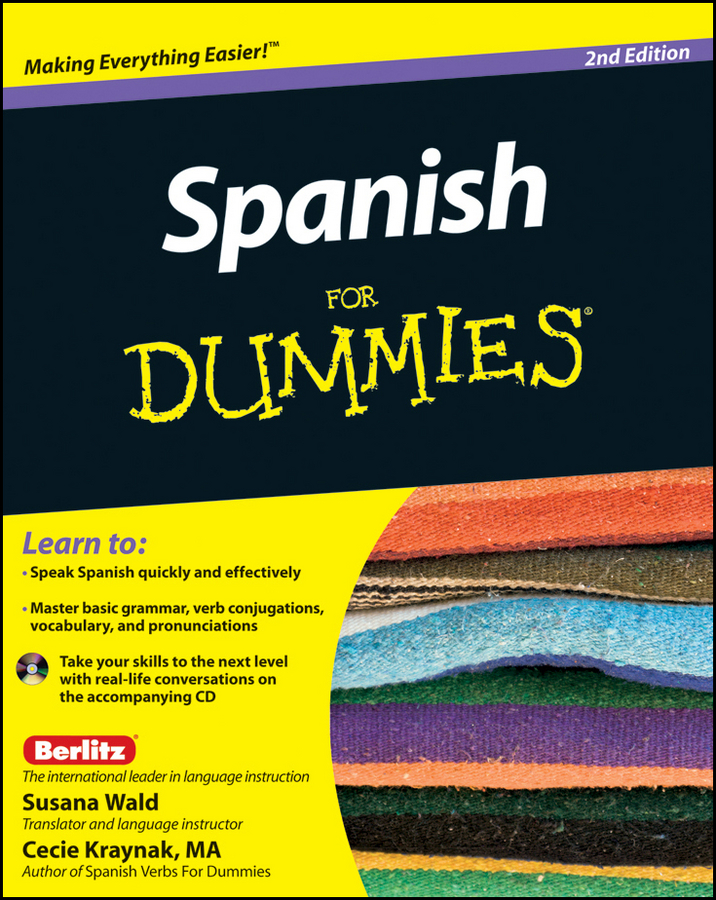Spanish verbs fall into different groups, and each group is conjugated a little differently. If you’re going to master Spanish verbs like cantar, you need to be able to identify which group a verb belongs to: regular (follows regular conjugation rules for -ar, -er, and -ir verbs), stem-changing (morphs depending on how you use it in a sentence), spelling-changing (has consonant-spelling changes in some forms to follow pronunciation rules), or reflexive (reflects the action back on the subject of the sentence).
Cantar (kahn-tahr) (to sing) is a regular -ar verb, so its conjugation is pretty straightforward. Here it is in the present tense:
| Conjugation | Translation |
|---|---|
| yo canto | I sing |
| tú cantas | You (informal) sing |
| él/ella/ello/uno canta | He/she/one sings |
| usted canta | You (formal) sing |
| nosotros cantamos | We sing |
| vosotros cantáis | You all (informal) sing |
| ellos/ellas cantan | They sing |
| ustedes cantan | You all (formal) sing |
The following examples show you cantar in action:
Ella canta en la escuela todos los días. (She sings at school every day.)
Canto y canto y no me canso. (I sing and sing and I don’t get tired.)
Need to know how to conjugate cantar in another tense? The following tables show you the preterit, imperfect, and future forms.
| Conjugation | Translation |
|---|---|
| yo canté | I sang |
| tú cantaste | You (informal) sang |
| él/ella/ello/uno cantó | He/she/one sang |
| usted canto | You (formal) sang |
| nosotros cantamos | We sang |
| vosotros cantasteis | You all (informal) sang |
| ellos/ellas cantaron | They sang |
| ustedes cantaron | You all (formal) sang |
You use the preterit tense like this:
Cantamos el himno nacional esta mañana. (We sang the National Anthem this morning.)
¿Cantaron tus padres cuando te casaste? (Did your parents sing when you got married?)
| Conjugation | Translation |
|---|---|
| yo cantaba | I used to sing |
| tú cantabas | You (informal) used to sing |
| él/ella/ello/uno cantaba | He/she/one used to sing |
| usted cantaba | You (formal) used to sing |
| nosotros cantábamos | We used to sing |
| vosotros cantabais | You all (informal) used to sing |
| ellos/ellas cantaban | They used to sing |
| ustedes cantaban | You all (formal) used to sing |
Here are some examples of the imperfect tense:
María cantaba siempre en la ducha. (Mary used to always sing in the shower.)
¿Cantaban ustedes cuando subían a las montañas? (Did you sing when you used to climb mountains?)
| Conjugation | Translation |
|---|---|
| yo cantaré | I will sing |
| tú cantarás | You (informal) will sing |
| él/ella/ello/uno cantará | He/she/one will sing |
| usted cantará | You (formal) will sing |
| nosotros cantaremos | We will sing |
| vosotros cantaréis | You all (informal) will sing |
| ellos/ellas cantarán | They will sing |
| ustedes cantarán | You all (formal) will sing |
The following samples put the future tense to work:
Jorge cantará en la boda este otoño. (Jorge will sing at the wedding this fall.)
Cantaré en el coro este domingo. (I will sing in the choir this Sunday.)

